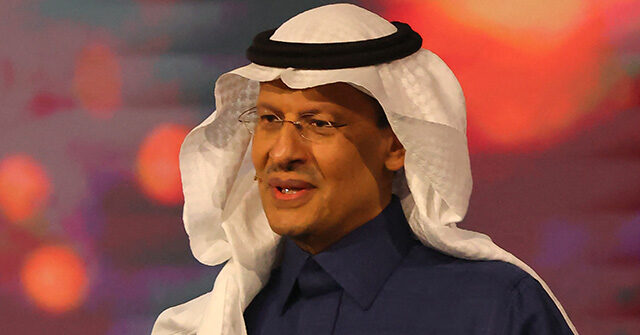U.S. Energy Secretary Chris Wright and Saudi Arabian Energy Minister Prince Abdulaziz bin Salman al-Saud on Wednesday signed a joint declaration on civilian nuclear cooperation, taking a step toward fulfilling Saudi Arabia’s nuclear power ambitions.
“Today is a historic day for the United States and the Kingdom of Saudi Arabia. We’ve come together on a deal for civil nuclear cooperation. Together, with bilateral safeguard agreements, we want to grow our partnership, bring American nuclear technology to Saudi Arabia and keep a firm commitment to nonproliferation,” Wright said.
“All of this is made possible because of President Trump’s vision of prosperity at home and peace abroad. This philosophy, this partnership, has transformed the Middle East into a region focused now on commerce, not conflict,” he said.
The first Trump administration began negotiations for a nuclear agreement with Saudi Arabia in 2018 but faced resistance from members of Congress who wanted stronger non-proliferation safeguards. Saudi Crown Prince Mohammed bin Salman’s (MBS) habit of saying that he wanted the option of going nuclear if Iran acquired nuclear weapons did nothing to alleviate these concerns.
The most effective safeguard against non-proliferation involves denying Saudi Arabia the technology to refine its own uranium. The Saudis were particular about wanting to manufacture their own nuclear fuel in 2018, pointing to the abundant uranium deposits on their own territory.
The clear reason Saudi Arabia wants nuclear power is to diversify its economy away from petroleum, the major stated goal of MBS’ ambitious decades-long reform program, Saudi Vision 2030. The less obvious reasons are national prestige – the United Arab Emirates (UAE) currently has the only functioning nuclear power plant in the Middle East – and water scarcity.
Saudi Arabia is the world’s largest producer of desalinated water and nuclear desalination is even more effective than the Kingdom’s current methods, as well as generating fewer carbon emissions. Other water-deprived Middle Eastern countries like Egypt and Jordan are exploring nuclear desalination, and Riyadh would like to become the regional leader in the field.
The Biden administration tried to negotiate a civilian nuclear power deal with Saudi Arabia, but it never seemed to make much progress – possibly because the Saudis were sensitive to Biden’s general hostility, and his administration’s palpable desire to revive the Iran nuclear deal. Whatever problems the Saudis had with making a deal seemed to melt away quickly once Joe Biden was out of office.
Energy Secretary Wright traveled to Riyadh in April to put the U.S. and Saudi Arabia back on “a pathway to unleash an unprecedented civil nuclear cooperation,” as the Energy Department put it.
The second Trump administration would also like to avoid driving Saudi Arabia into the arms of Russia or China to obtain its nuclear technology. The Saudis have made it increasingly clear that they intend to sell their yellowcake uranium to someone and, with oil prices down, uranium is ever more appealing as a profit center.
The deal pursued by Wright included big Saudi investments in U.S.-based uranium enrichment, a double play that would reduce the risk of weapons proliferation by keeping enrichment under U.S. control, and also make the United States less dependent on Russia for its supply of enriched uranium.
Congress would have final approval over any deal with Saudi Arabia, and lawmakers once again expressed concerns about nuclear weapons proliferation on Wednesday, demanding the “gold standard” of a total ban on Saudi uranium enrichment plus aggressive inspections of their nuclear facilities. Israel is also very keen on ensuring that neither Saudi Arabia nor Iran can enrich uranium to weapons-grade levels.
“It is about civilian, civil use of nuclear power. It’s not about enrichment. It’s not about anything related to weapons. It’s just about generating electricity, secure, reliable, affordable electricity,” Wright said of the deal in a Fox News interview on Wednesday.
Read the full article here


